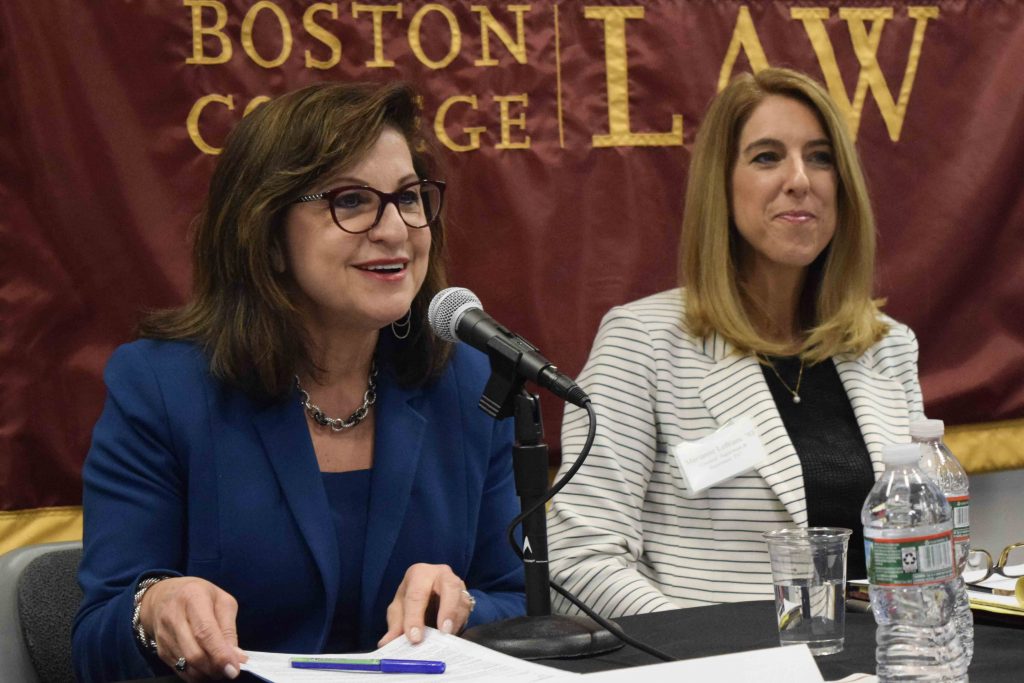After an academic year in which the #MeToo and #TimesUp movements shined light on issues impacting women in many professions, the Boston College Women’s Law Center hosted a panel discussion April 19 to elicit Women’s Bar Association practitioners’ experience and advice on legal careers.
“Women to Women: Issues and Strategies for Women Entering Law” featured Carmen Ortiz of Anderson & Kreiger and former US Attorney for the District of Massachusetts; Marianne LeBlanc ’93 of Sugarman & Sugarman; Meredith Ainbinder ’04, deputy general counsel at Emerson College; and Alexandra Mitropoulis ’15 of Hirsch Roberts Weinstein. It was co-sponsored with the WBA, BC Law Dean’s and Career Services offices, and Anderson & Kreiger.
Dean Vincent Rougeau began the event by highlighting the urgent need for these discussions in a legal context. “The importance of the #MeToo and #TimesUp movements can’t be overstated and talking about these issues is critical to making change,” he said. “Harassment is damaging to firms, businesses, and institutions, and it’s devastating to our female students and graduates, personally and professionally.”
Moderator Stacey Kourtis ’19, co-president of the Women’s Law Center, started by asking panelists about their experiences with routine sexual harassment in the legal profession.
“I’ve been an attorney for more than 30 years, and this is not a new problem,” Ortiz said. She talked about investigating Lisa Olson’s harassment allegations against the New England Patriots in 1990, which was followed in short succession by the Clarence Thomas/Anita Hill scandal. “We all thought, then, that national news would expose this crisis” of harassment, Ortiz said. “This was happening within a major sports organization and a Supreme Court confirmation hearing. We thought something had to happen.”
Ortiz conceded that Massachusetts passed a statute requiring sexual harassment training in workplaces after the Olson incident, and that many industries implemented new policies or required training seminars, but stressed that it wasn’t enough. She’s hopeful that now will be different. “There’s no turning around now,” she added. “With so many allegations, in so many different industries, something big has to change.”
The panelists moved on to their own experiences in the workplace and how they dealt with harassment or unfair treatment as young attorneys. “What’s important is that your career isn’t held back,” Ainbender told the audience. “Make sure these latent things that can affect you are challenged. As you earn credibility you must continue to assert yourself.”
“You’re not always going to have the opportunity to stand up directly to supervisors as a new attorney,” Mitropoulis added, “so it’s critically important to find a mentor who can help you address [harassment and discrimination] when it happens.”
Mitropoulos talked of the importance of women supporting each other, for example by making affirmative statements about points women are raising in meetings when the men in the room either aren’t listening to them or are talking over them. And LeBlanc struck a note of optimism when she observed that judges in her experience are increasingly asking for and respecting the voices of women litigants in the courtroom.
Other topics the panelists addressed included the importance of mentoring and the benefits to women of technologies that allow for more flexible work schedules and environments.
Ainbinder also offered a checklist of things that women entering the profession should know. Among her tips: understand the business of law; don’t over explain where you’ll be when you’re not in the office; strategically select projects that are the most meaningful to you; be seen and known around the office; always take the high road; don’t rush your work; and apply for jobs even if you don’t think you’ll get them.
Photo, from left: Carmen Ortiz and Marianne LeBlanc ’93
McNeil Named Woman of the Year
At another event two days earlier, Josephine McNeil ’87 was named Woman of the Year by the the BC Women’s Law Center. She recently retired as the executive director of CAN-DO, a nonprofit in Newton that provides low-income housing for underserved populations. Read the BC Law Impact blog about McNeil’s career and the qualities that earned her the 2018 award.



